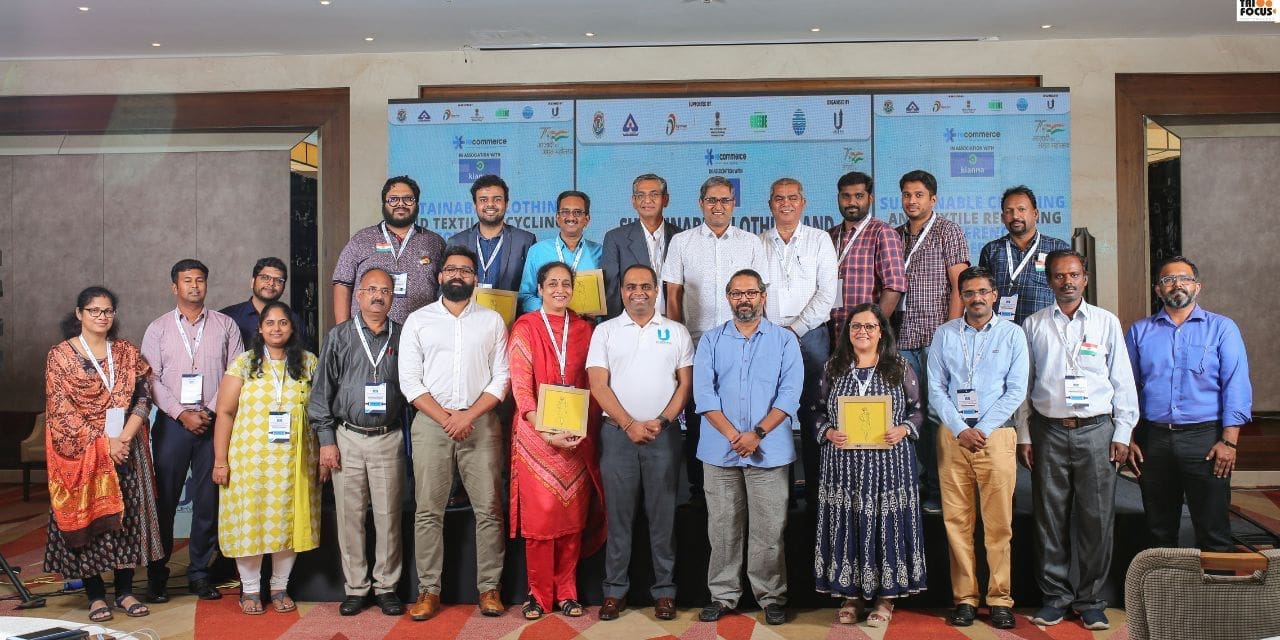
Urdhva Management Pvt. Ltd., under the brand Recommerce in association with Kianna Media Ventures, successfully organised the third edition of “Sustainable Clothing and Textile Recycling Conference”- at The Residency Towers, Coimbatore, Tamil Nadu, India, on the 10th August 2022. The Conference was organised professionally, with more than 100 distinguished delegates from all over the country attending the event. Ministry of Environment Forest and Climate Change, Ministry of Electronics and Information Technology, Digital India, Greene, and Tamil Nadu State Pollution Control Board officially supported the event.

The Conference received an overwhelming response. There was good interaction between participants, who posed many questions to panel members and were answered very promptly by the panel members. All the sessions of panel discussions were exciting and memorable. The delegates were intensely involved till the last Session to take advantage of the panel discussion.
The Conference covered the entire spectrum of the textile recycling industry, from Policies to Indian efforts to building a Sustainable textile market. Recommerce gave the excellent opportunity to the leading textile manufacturers, experts in waste management, up cyclers and recyclers, Research centers, Policymakers, and industry stakeholders to come under one roof to provide a good platform for mutual advantage and commercial interaction.

The Conference was organised in the Senator hall at Residency Tower in Coimbatore. The Chief Guest of the event Hon’ble union minister Shri. Piyush Goyal addressed the gathering at 6 pm virtually. The Guest of Honour were Smt. Prajakta L Verma, IAS, Joint Secretary, Ministry of Textiles, who connected virtually and delivered the keynote address & Smt. K Nalini, Joint Chief Environmental Engineer, Tamil Nadu State Pollution Control Board.
Mr. Venkatreddy Patil, Founder and Managing director, Urdhva Management Pvt Ltd, and Mr. Savio Rodrigues, Founder and CEO, Kianna Media Ventures, welcomed the Guest of Honour Smt. K Nalini, and with blessings from the almighty, the Conference was inaugurated with the lighting of a lamp.
Mr. Patil welcomed the gathering and said that Urdhva Management was happy to organise the Sustainable Clothing and Textile Recycling conference in Coimbatore, which is known as one of the biggest centres of textile manufacturing located in the southern state of Tamil Nadu. He also welcomed all the Speakers, Invitees & Delegates to the Conference and expressed that the company works in various ways on recycling and is open to collaboration in the field.
Smt. K Nalini, the Guest of Honour for the Conference, said, “Due to the over consumption by the people, waste is increasing at a high rate, hence the need for textile recycling. Textile recycling is the need of the hour. Greenhouse emissions and water pollution are increasing due to improper disposal of textile waste. There is a lot of business potential in textile recycling. I feel this is a strategic conference to bring out the solutions for most sustainable development goals like good life for the land, sustainable production and good sanitation in India and across the world.”
In his speech, Mr. Savio Rodrigues, shared the status of the Yamuna river and said that every year half a million kg of plastics are thrown into the ocean as wastage and emphasised having a pollution-free world. He said, “Don’t be an observer – be a preserver”.
We aim to create an ecosystem of community members from various fields to address the critical discussions that can act as a bridge to revamp the industry.
In all, there were eight technical papers presented at the Conference.
Smt. Prajakta L Verma IAS, Joint Secretary, Ministry of Textiles, Government of India, expressed her views on “Textile Recycling Practices and Circular Economy Challenges”.
She gave insights into the drastic change in clothing pattern consumption and disposal and how the production process can be mapped and digitalised for upgradation. By intensifying technological advancements in the field, it can assist the development. “Textile industry is ancient, but our consumption patterns have changed. We are generating about 7,793 kilo tons of waste. Though we are reusing it, most of it does not find a place in the supply value chain because of a lack of awareness. Most of us are working in a disintegrated, unorganised fashion. We must start thinking very seriously about how we try to bring a circular and self-sufficient approach to this industry. The circular approach is a take, make and source model that increases the value as much as possible at the system’s root and tries to retain the value by using, reusing, and recycling the waste generated. We should incentivise the mechanical and chemical cycling technology.” she said.

